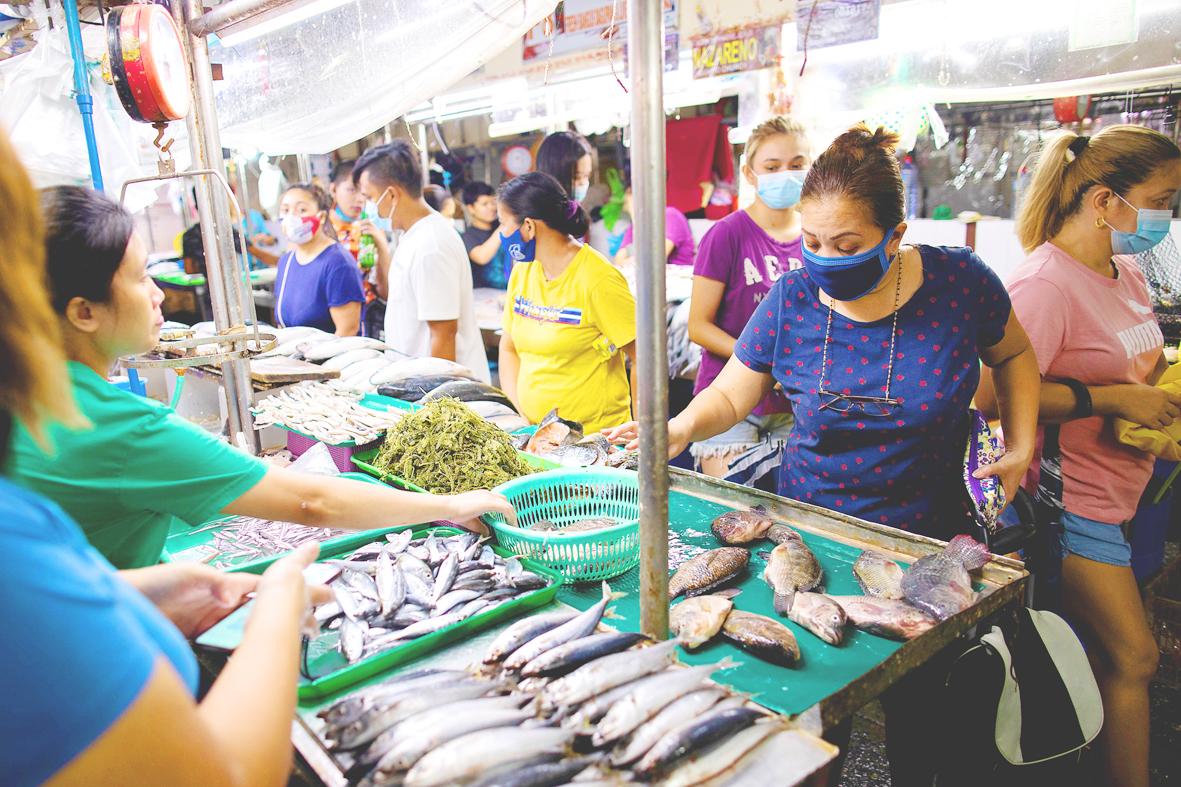Philippine President Rodrigo Duterte has agreed to place the capital and outlying provinces back under a lockdown after medical groups warned that the country was waging “a losing battle” against COVID-19 amid an alarming surge in infections.
Presidential spokesman Harry Roque yesterday said that Metro Manila, the national capital region of more than 12 million people, and five densely populated provinces would revert to stricter quarantine restrictions for two weeks starting today.
The move, which finance and economic officials oppose, will again prohibit non-essential travel outside of homes.

Photo: Reuters
Duterte relaxed the nation’s lockdown on June 1 in a bid to restart the stagnant economy.
Under the new restrictions, police checkpoints will return to ensure only authorized people, including medical personnel and workers in vital companies, venture out of their homes, Secretary of the Interior Eduardo Ano said.
Other businesses previously allowed to partly reopen, including barbershops, Internet cafes, gyms, restaurants, massage and tattoo shops, drive-in cinemas and tourist destinations, will again be closed.
Authorized companies, including banks, health and food processing firms, can operate partly, but need to shuttle their employees from home and work.
Workers can travel by bike, motorcycles and private vehicles, but mass transit will be closed.
Businesses in the capital and outlying regions comprise about 67 percent of the national economy, and the Duterte administration has walked a tightrope between public health and economic revival.
The economy contracted slightly in the first quarter, but is likely facing a deep recession from the massive business closures that started when Duterte declared a strict lockdown in the middle of March.
Leaders of nearly 100 medical organizations held a rare online news conference on Saturday and warned that the health system has been overwhelmed by infection spikes and might collapse as health workers fall ill or resign from exhaustion and fear.
They asked Duterte to reimpose a tight lockdown in the capital to allow the government to give health workers “a time out” and allow the government to recalibrate its response to the pandemic.
“We are waging a losing battle against COVID-19 and we need to draw up a consolidated, definitive plan of action,” the groups said in a letter to Duterte that they read publicly.
They expressed fears that the Philippine COVID-19 crisis might worsen like in the US.
The Department of Health on Sunday reported a record-high daily tally of 5,032 confirmed cases, bringing the nation’s total to 103,185, including more than 2,000 deaths.
While he granted the demand, Duterte appeared irritated after the medical groups went public with critical remarks, saying they could have talked to him first.
“If you will stage a revolution, you will give me the free ticket to stage a counterrevolution. How I wish you would do it,” Duterte said in televised remarks on Sunday night.
“You yourself don’t have any solution. What are you babbling about?” he asked.

SECURITY: As China is ‘reshaping’ Hong Kong’s population, Taiwan must raise the eligibility threshold for applications from Hong Kongers, Chiu Chui-cheng said When Hong Kong and Macau citizens apply for residency in Taiwan, it would be under a new category that includes a “national security observation period,” Mainland Affairs Council (MAC) Minister Chiu Chui-cheng (邱垂正) said yesterday. President William Lai (賴清德) on March 13 announced 17 strategies to counter China’s aggression toward Taiwan, including incorporating national security considerations into the review process for residency applications from Hong Kong and Macau citizens. The situation in Hong Kong is constantly changing, Chiu said to media yesterday on the sidelines of the Taipei Technology Run hosted by the Taipei Neihu Technology Park Development Association. With

CARROT AND STICK: While unrelenting in its military threats, China attracted nearly 40,000 Taiwanese to over 400 business events last year Nearly 40,000 Taiwanese last year joined industry events in China, such as conferences and trade fairs, supported by the Chinese government, a study showed yesterday, as Beijing ramps up a charm offensive toward Taipei alongside military pressure. China has long taken a carrot-and-stick approach to Taiwan, threatening it with the prospect of military action while reaching out to those it believes are amenable to Beijing’s point of view. Taiwanese security officials are wary of what they see as Beijing’s influence campaigns to sway public opinion after Taipei and Beijing gradually resumed travel links halted by the COVID-19 pandemic, but the scale of

A US Marine Corps regiment equipped with Naval Strike Missiles (NSM) is set to participate in the upcoming Balikatan 25 exercise in the Luzon Strait, marking the system’s first-ever deployment in the Philippines. US and Philippine officials have separately confirmed that the Navy Marine Expeditionary Ship Interdiction System (NMESIS) — the mobile launch platform for the Naval Strike Missile — would take part in the joint exercise. The missiles are being deployed to “a strategic first island chain chokepoint” in the waters between Taiwan proper and the Philippines, US-based Naval News reported. “The Luzon Strait and Bashi Channel represent a critical access

Pope Francis is be laid to rest on Saturday after lying in state for three days in St Peter’s Basilica, where the faithful are expected to flock to pay their respects to history’s first Latin American pontiff. The cardinals met yesterday in the Vatican’s synod hall to chart the next steps before a conclave begins to choose Francis’ successor, as condolences poured in from around the world. According to current norms, the conclave must begin between May 5 and 10. The cardinals set the funeral for Saturday at 10am in St Peter’s Square, to be celebrated by the dean of the College